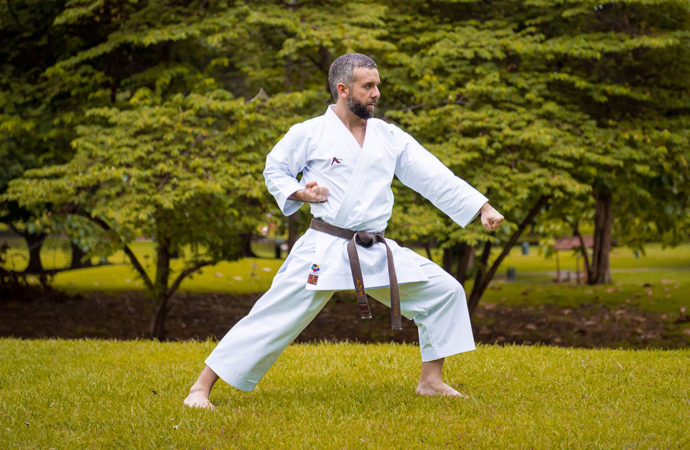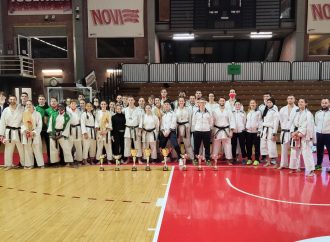A dojo needs happy parents, because they will participate more actively in their child’s martial arts education.
(Versione italiana in calce)
How do you measure “progress”? How can we explain to someone that has absolutely no idea of karate that they are getting better at what they are doing? This is not an easy task, especially for Instructors, senior black belts, and dojo owners.
One of the most common things I hear from parents in the dojo is that they do not really know if their child is making true improvement in their technique. And because of this, many get disappointed, anxious, and even frustrated. This is perfectly understandable, if we take into account that most parents are not karatekas and that, in many cases, the parents cannot stay and watch their child during the class.
How can we explain to someone that has absolutely no idea of karate that they are getting better at what they are doing?
The question is: what can and should we do? The answer is pretty simple: inform the parents periodically of their child’s progress, strengths and weaknesses, just as a regular school does. That’s it. Communication is the key to solve any problem between two parties.
I am a firm believer that feedback in Karate is generally too slow, regardless of the Organization or Federation. A parent’s key performance indicators (KPI) is the belt test and a competition. The time between belts varies from style to style, but in most cases is between 3 and 9 months. This is way too long!
Let’s imagine for once that we decide to try a new sport or martial art: you get excited and start training 3 to 4 times a week. After a couple of weeks you start to wonder if you are actually improving or not, but when you ask the question the answer you get is: “Let’s talk in 6 months”. What would you do?
Of course I am exaggerating, but the point is that when parents don’t see that their child is actually making the most of his or her time, then that child might not last too long in the dojo. Now, I am not saying that we should speed up the tests or competitions, I am just saying that communicating with the parents is fundamental for a child’s education. The Instructor can be many things, but one of them is definitely not a magician. If a child is not behaving properly, or has a special condition, or maybe even suffers from low self-esteem, these issues should be addressed beyond the dojo, and the only way we can achieve that is by working with the parents as a team.
Parents are used to this system because schools generally work this way. That means that this is the bar we should be comparing ourselves with. A short and simple feedback will have a huge impact in the service that is being provided and, in the long run, it will add a very strong value to the dojo.
I am a firm believer that feedback in Karate is generally too slow.
Whenever you hear from a mother or father that their child has not participated in an activity because they were not aware of it, or because the information was sent too late, that should a red flag. A dojo needs happy parents, because a happy parent will participate more actively in their child’s martial arts education.
This type of “customer service” is not seen often in martial arts schools: differentiate yourself! Dare to give a better service by improving the feedback and communication with your parents. Remember, no parents… no children.
Genitori felici nel dojo
Un dojo ha bisogno di genitori felici, perché parteciperanno più attivamente alla formazione nell’arte marziale del proprio bambino.
Come si misura il “progresso”? Come si può spiegare a qualcuno, che non ha assolutamente idea del karate, che sta migliorando in ciò che sta facendo? Non si tratta di un compito facile, soprattutto per gli istruttori, cinture nere senior e proprietari di dojo.
Una delle cose più comuni che ho sentito dai genitori nel dojo è che non sanno se il loro bambino sta avendo un vero miglioramento nella propria tecnica. Per questo motivo molti si sentono delusi, ansiosi e anche frustrati. Ciò è perfettamente comprensibile, se teniamo in conto che la maggior parte dei genitori non sono atleti e che in molti casi non possono rimanere a guardare il proprio figlio durante la lezione.
Come si può spiegare a qualcuno, che non ha assolutamente idea del karate, che sta migliorando in ciò che sta facendo?
La domanda è: cosa possiamo e dobbiamo fare?
La risposta è abbastanza semplice: informare i genitori periodicamente dei progressi del loro bambino, dei suoi punti di forza e di debolezza, proprio come fa una scuola regolare. Questo è quanto. La comunicazione è la chiave per risolvere qualsiasi problema tra le due parti.
Io sono un convinto sostenitore che il feedback nel Karate è generalmente troppo lento, indipendentemente dall’Organizzazione o dalla Federazione.
Gli Indicatori di Prestazioni Chiave (KPI) di un genitore sono i test di cintura e le gare. Il tempo che intercorre tra le cinture varia da stile a stile, ma nella maggior parte dei casi è tra i 3 e i 9 mesi. Questo periodo è davvero troppo lungo!
Immaginiamo di aver deciso di provare un nuovo sport o un’arte marziale: arriviamo entusiasti e iniziamo l’allenamento 3 o 4 volte alla settimana. Dopo un paio di settimane iniziamo a chiederci se stiamo effettivamente migliorando o meno, ma, quando si pone questa domanda, la risposta che si ottiene è: “Ne parliamo fra 6 mesi”. Voi che cosa fareste?
Naturalmente sto esagerando, ma il punto è che quando i genitori vedono che il loro bambino non sta sfruttando al massimo il proprio tempo, quel bambino potrebbe non durare a lungo nel dojo. Ora, non sto dicendo che dovremmo accelerare i test o le gare, sto solo dicendo che la comunicazione con i genitori è fondamentale per l’educazione di un bambino.
L’istruttore può essere molte cose, ma sicuramente non un mago. Se un bambino non si comporta correttamente, o ha una condizione speciale o, forse, una bassa autostima, queste cose dovrebbero essere affrontate nel dojo e l’unico modo è lavorando in squadra con i genitori.
I genitori sono abituati a questo sistema, perché le scuole generalmente funzionano in questo modo. Ciò significa che questa è lo standard con il quale dovremmo confrontarci. Un breve e semplice feedback avrà un enorme impatto nel servizio che viene fornito e a lungo termine aggiungerà un grandissimo valore al dojo.
Io sono un convinto sostenitore che il feedback nel Karate è generalmente troppo lento.
Ogni volta che si sente da una madre o da un padre che il loro figlio non ha partecipato a un’attività perché non ne erano al corrente, o perché le informazioni sono state inviate troppo tardi, ciò dovrebbe far scattare campanelli d’allarme. Un dojo ha bisogno di genitori felici, perché un genitore felice parteciperà più attivamente alla formazione nell’arte marziale del proprio bambino.
Questo tipo di “servizio al cliente” non è visto spesso nelle scuole di arti marziali: differenziatevi! Abbiate il coraggio di dare un servizio migliore, migliorando il feedback e la comunicazione con i genitori. Ricordate, no genitori… no figli.

















